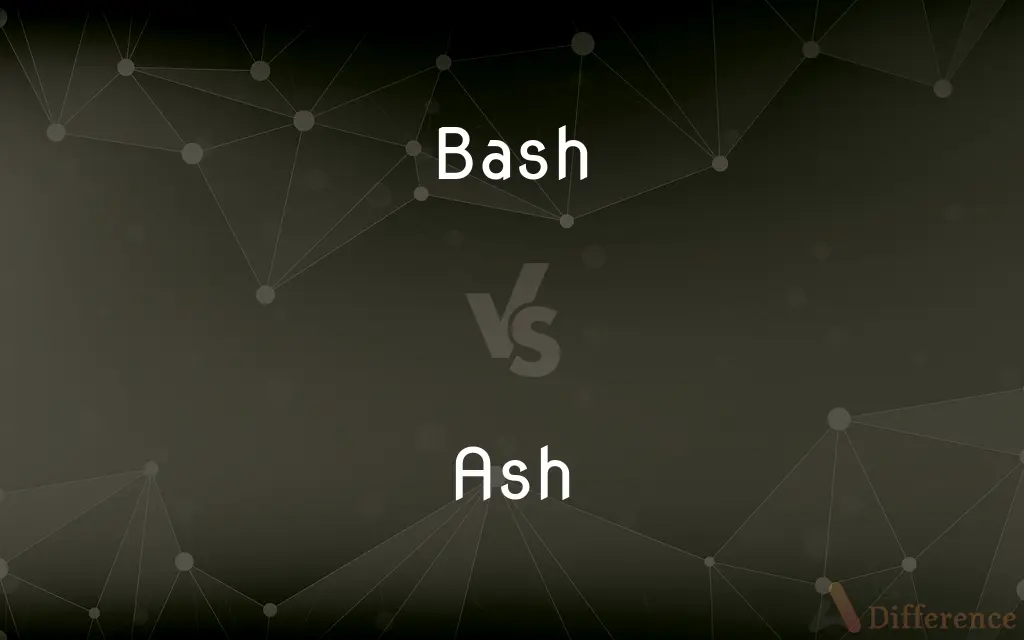Bash vs. Ash — What's the Difference?
By Fiza Rafique & Urooj Arif — Updated on April 15, 2024
Bash is command language and Unix shell introduced by Brian Fox in 1989, offering extensive features such as scripting & command history. Almquist Shell (ash) is lightweight, POSIX-compliant shell known for its execution speed & lower resource use.

Difference Between Bash and Ash
Table of Contents
ADVERTISEMENT
Key Differences
Bash (Bourne Again SHell) is an advanced Unix shell and command language, which is the default on many Linux distributions and macOS, offering a wide array of features including scripting, job control, and user interface improvements like command completion. Ash (Almquist Shell), on the other hand, is designed to be light and fast, sacrificing some user-friendly features for performance and system efficiency.
Bash supports a variety of programming constructs such as arrays and associative arrays that allow complex data manipulations within scripts. Whereas Ash focuses on standard sh features, avoiding the implementation of additional features to maintain portability and speed across different systems.
Bash includes built-in commands for programming convenience like [[ for advanced test operations and (( for arithmetic evaluation, enhancing its capabilities as a scripting environment. Ash, however, sticks closely to standard sh syntax and utilities, prioritizing compatibility with the POSIX standard over additional features.
Bash incorporates many interactive use enhancements such as command history, command line editing, and autocompletion which are tailored to improve user experience. In contrast, Ash offers minimal interactive features to maintain a smaller footprint and faster execution, making it ideal for system rescue environments or embedded systems.
Bash allows users to extend its functionality through numerous external commands and scripts due to its widespread adoption and community support. Ash, while it can run most POSIX scripts, has a smaller user base and fewer specialized resources, focusing more on being a lightweight alternative to more feature-rich shells.
ADVERTISEMENT
Comparison Chart
Release Year
1989
1989
Designed by
Brian Fox
Kenneth Almquist
Usage
Default shell on many Linux systems
Preferred for lightweight environments
Features
Scripting, job control, UI enhancements
Minimalist, adheres to POSIX
Strengths
Extensive feature set, wide adoption
Speed, efficiency, resource conservation
Compare with Definitions
Bash
Scripting environment.
Bash scripts can include functions, loops, and conditionals.
Ash
Lightweight.
Ash requires fewer resources, making it ideal for older hardware.
Bash
Unix shell.
Bash processes user commands entered in the terminal.
Ash
Unix shell.
Ash is compatible with most Unix-like operating systems.
Bash
Interactive features.
Bash supports command line editing and history.
Ash
Minimalist.
Ash includes only essential features to maintain simplicity.
Bash
Extensible.
Bash can be extended with custom commands and scripts.
Ash
POSIX-compliant.
Ash adheres strictly to the POSIX standard for maximum compatibility.
Bash
Command language.
Bash can be used to write scripts that automate routine tasks.
Ash
Fast execution.
Ash executes scripts faster than many other shells.
Bash
To strike with a heavy, crushing blow
The thug bashed the hood of the car with a sledgehammer.
Ash
Ash or ashes are the solid remnants of fires. Specifically, ash refers to all non-aqueous, non-gaseous residues that remain after something burns.
Bash
To beat or assault severely
The police arrested the men who bashed an immigrant in the park.
Ash
The powdery residue left after the burning of a substance
I turned over the ashes
Cigarette ash
Bash
(Informal) To criticize (another) harshly, accusatorially, and threateningly
"My point is not to bash teachers or healthcare providers" (Richard Weissbourd).
Ash
A trophy for the winner of a series of Test matches in a cricket season between England and Australia.
Bash
To engage in harsh, accusatory, threatening criticism.
Ash
A tree with compound leaves, winged fruits, and hard pale timber, widely distributed throughout north temperate regions.
Bash
(Informal) A heavy, crushing blow.
Ash
An Old English runic letter, ᚫ, a vowel intermediate between a and e. It is represented in the Roman alphabet by the symbol æ or Æ.
Bash
(Slang) A celebration; a party.
Ash
The grayish-white to black powdery residue left when something is burned.
Bash
(informal) To strike heavily.
The thugs kept bashing the cowering victim.
If the engine won't start, bash it with this hammer.
Ash
(Geology) Pulverized particulate matter ejected by volcanic eruption.
Bash
(informal) To collide; used with into or together.
Don't bash into me with that shopping trolley.
Ash
The mineral residue of incinerated organic matter, used as an additive in pet foods.
Bash
To criticize harshly.
He bashed my ideas.
Ash
Ashes Ruins
The ashes of a lost culture.
Bash
To abash; to disconcert or be disconcerted or put out of countenance.
Ash
Ashes Bodily remains, especially after cremation or decay.
Bash
(informal) A forceful blow or impact.
He got a bash on the head.
Ash
Any of various chiefly deciduous trees of the genus Fraxinus, having opposite, pinnately compound leaves, clusters of small flowers, and one-seeded winged fruits.
Bash
(informal) A large party; a gala event.
They had a big bash to celebrate their tenth anniversary.
Ash
The strong, elastic wood of any of these trees, used for furniture, tool handles, and sporting goods such as baseball bats.
Bash
An attempt at doing something.
I'm not sure I'll be any good at this, but let me have a bash.
This was my first bash at macramé, so I'm quite pleased with how it's turned out.
Give something a bash
Ash
(Linguistics) The letter æ in Old English and some modern phonetic alphabets, representing the vowel sound of Modern English ash.
Bash
To abash; to disconcert or be disconcerted or put out of countenance.
His countenance was bold and bashed not.
Ash
To reduce or convert to ash
Ash a tissue sample for analysis.
Bash
To strike heavily; to beat; to crush.
Bash her open with a rock.
Ash
(Informal) To drop ashes from a cigar or cigarette
Accidentally ashed on his own sleeve.
Bash
A forceful blow, especially one that does damage to its target.
Ash
The solid remains of a fire.
The audience was more captivated by the growing ash at the end of his cigarette than by his words.
Ash from a fireplace can restore minerals to your garden's soil.
Ashes from the fire floated over the street.
Ash from the fire floated over the street.
Bash
A elaborate or lively social gathering or party.
Ash
(chemistry) The nonaqueous remains of a material subjected to any complete oxidation process.
Bash
A vigorous blow;
The sudden knock floored him
He took a bash right in his face
He got a bang on the head
Ash
Fine particles from a volcano, volcanic ash.
Bash
An uproarious party
Ash
(in the plural) Human (or animal) remains after cremation.
The urn containing his ashes was eventually removed to a closet.
Bash
Hit hard
Ash
Mortal remains in general.
Napoleon's ashes are not yet extinguished, and we're breathing in their sparks.
Ash
(figuratively) What remains after a catastrophe.
Ash
A gray colour, like that of ash.
Ash
A shade tree of the genus Fraxinus.
The ash trees are dying off due to emerald ash borer.
The woods planted in ash will see a different mix of species.
Ash
(uncountable) The wood of this tree.
Ash
The traditional name for the ae ligature (æ), as used in Old English.
Ash
(chemistry) To reduce to a residue of ash. See ashing.
Ash
(intransitive) To hit the end off of a burning cigar or cigarette.
Ash
(transitive) To hit the end off (a burning cigar or cigarette).
Ash
To cover newly-sown fields of crops with ashes.
Ash
A genus of trees of the Olive family, having opposite pinnate leaves, many of the species furnishing valuable timber, as the European ash (Fraxinus excelsior) and the white ash (Fraxinus Americana).
Ash
The tough, elastic wood of the ash tree.
Ash
Sing. of Ashes.
Ash
To strew or sprinkle with ashes.
Ash
The residue that remains when something is burned
Ash
Any of various deciduous pinnate-leaved ornamental or timber trees of the genus Fraxinus
Ash
Strong elastic wood of any of various ash trees; used for furniture and tool handles and sporting goods such as baseball bats
Ash
Convert into ashes
Common Curiosities
Why is Ash considered lightweight?
Ash is designed to use minimal system resources, making it suitable for environments where efficiency is crucial.
Can Bash run Ash scripts?
Yes, Bash can execute scripts written for Ash, as it is backwards compatible with sh.
What makes Bash popular among developers?
Bash's extensive feature set, including scripting capabilities and interactive enhancements, makes it a favorite among developers.
Does Ash support scripting?
Yes, Ash supports scripting but within the constraints of standard sh features.
What is Bash primarily used for?
Bash is used as the default command interpreter on many Unix-based systems, ideal for both interactive use and scripting.
Is Ash suitable for beginners?
Due to its lack of some interactive features, Ash may not be as user-friendly for beginners compared to Bash.
What are the main reasons to choose Ash over Bash?
The main reasons include needing a shell that uses fewer resources and executes faster.
How does Bash improve command line use?
Bash provides command line editing, history, and autocompletion, enhancing user interaction.
Are there any platforms where Ash is the default shell?
Ash is often the default shell in lightweight distributions and embedded systems.
Can Bash scripts be too complex for Ash to handle?
Yes, scripts using Bash-specific features like arrays will not run in Ash.
Share Your Discovery

Previous Comparison
Drawing vs. Design
Next Comparison
Bromide vs. BromateAuthor Spotlight
Written by
Fiza RafiqueFiza Rafique is a skilled content writer at AskDifference.com, where she meticulously refines and enhances written pieces. Drawing from her vast editorial expertise, Fiza ensures clarity, accuracy, and precision in every article. Passionate about language, she continually seeks to elevate the quality of content for readers worldwide.
Co-written by
Urooj ArifUrooj is a skilled content writer at Ask Difference, known for her exceptional ability to simplify complex topics into engaging and informative content. With a passion for research and a flair for clear, concise writing, she consistently delivers articles that resonate with our diverse audience.
















































